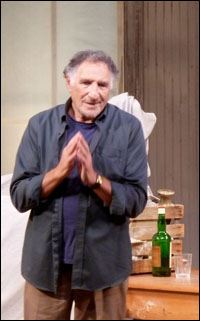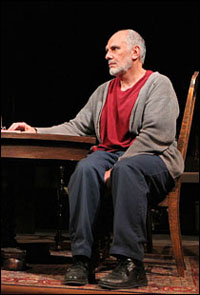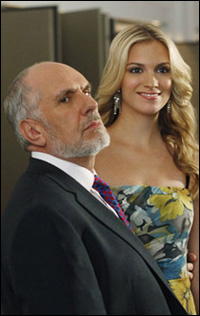
*
The number one item at the top of Michael Cristofer's resume is The Shadow Box, the 1977 play that won him the Tony Award for Best Play and Pulitzer Prize for Drama. But a theatre-loving alien who landed in New York only three years ago would be convinced that Cristofer (pronounced Criss-TOFFER) is actually a prominent stage actor. In recent seasons, he has had prominent roles in the Gregory Mosher Broadway revival of A View From the Bridge and the New York premiere of Tony Kushner's The Intelligent Homosexual's Guide to to Capitalism and Socialism With a Key to the Scriptures. This past year, his acting profile rose even further with his recurring role as Anjelica Huston's oily, dismissive producer ex-husband on the television series "Smash." This summer, however, Cristofer is returned to his writing roots, with the Dorset Theatre Festival production of his new play The Whore and Mr. Moore, starring Judd Hirsch, now to Aug. 11 in Dorset, VT. Cristofer talked to Playbill.com about his double life.
How did your new play come to be at the Dorset Theatre Festival?
Michael Cristofer: I came up here about three seasons ago to act in a new Theresa Rebeck play called The Novelist. I'd done a couple readings of it in New York, and then we took it up here and did a full production. [DTF has] recently been taken over by a new artistic director, Dina Janis. And that's how I discovered the theatre.
So you gave them your new play to consider?
MC: Yes. The theatre [Dorset Playhouse] is quite wonderful. It's been renovated and has a really wonderful proscenium stage. It's very comfortable for the actors, the dressing rooms and everything. There were some technical and magical things in the play that I knew they could handle. And there's the audience, which is quite nice. They're up for new plays. I could tell by their response to Theresa's play, which was fairly complex and interesting, that it was a pretty smart audience and a supportive audience. Besides, it's beautiful here. It's kind of what Williamstown [Theatre Festival] used to be before it got so big. It's very much like that. I felt it was a good place.
 |
||
| Judd Hirsch in The Whore and Mr. Moore. |
MC: Well, that's a quote out of context. I don't want to get caught comparing myself to Noel Coward. What I had said was I wanted to write this sort of romantic thing about a playwright and a ghost. As I was doing it, the characters started to take over, and instead of being romantic it started to be funny. There were shades of Noel Coward, and it started to get Shavian. It was just like in the play, where the main character is a playwright, and the character that he creates takes over the play and makes the play something other than he intended. So "Mr. Moore" of the title is the playwright and the "Whore" is the ghost?
MC: Yes. This all happened because, a long time ago when I was writing screenplays, one of the studios wanted to make a remake of "The Ghost and Mrs. Muir." But they wanted to update it, make the woman a contemporary woman and they didn't want her to die at the end. I thought that was a really bad idea. I went back to them and said, "Why don't you reverse it and make it this older guy who goes to this house and it's haunted by this young beautiful woman, so at the end of this film if the old guy dies and goes to Heaven, nobody's going to feel bad." And they didn't like that idea. But it stuck with me, and years later I started fiddling with the idea. I think I was in a depressed state of being a playwright. I created this character of this playwright who rents this house on the coast of Maine looking for inspiration to write his last, great, wonderful play. He goes there and finds the house is haunted by the ghost of a 19th-century prostitute.
 |
||
| Cristofer in Tony Kushner's Intelligent Homosexual's Guide... |
||
| Photo by Joan Marcus |
MC: I do now, because last night, the first preview, was a rather wonderful evening. The play really works and I'm really happy with it.
Is this your first new play in a while?
MC: Yeah. Well, I kind of moved away from the movie world a few years ago.
And you've been very prominent as an actor on the New York stage lately, with roles in A View From the Bridge on Broadway and Tony Kushner's Intelligent Homosexual's Guide...
MC: What happened was Joanne Woodward and Paul Newman asked me to act in a play in Westport about four years ago. I thought, well, maybe this is the time to look into that again and see if I can still do it. So I went and did it. It was a two-character play [Old Wicked Songs] and it was very difficult. I had to do a Viennese accent, play the piano and sing German lieder. I thought, well, if I could do this, I can still hold my own on stage. That led to doing Shakespeare in the Park, I did the Romeo and Juliet that Michael Greif directed. Suddenly, I was back in the theatre again, feeling like a kid. And then I've been doing some TV, too. I did a wonderful series that didn't succeed, "Rubicon."
But you're in another series, "Smash," that got picked up for a second season.
MC: [Laughs.] Yeah. Theresa's series.
Is that how you got involved? Series creator Theresa Rebeck thought of you for the part?
MC: Yes. And [casting director] Bernie Telsey knew my work. It was a character they didn't have in the pilot. I went and shot one scene and they decided to expand it. I've started now with the second season.
 |
||
| Cristofer and Erin Wyatt on "Smash." |
||
| photo by Will Hart/NBC |
MC: No. I'm not a regular character. I'm a recurring character. I have spoken to the new showrunner who's taken over from Theresa. He's very involved in what happens this season. I hope it works out. I also hope [that I don't] have too many episodes, because I'm going to do the new Stephen Belber play Don't Go Gentle at MCC Theater in the fall.
Will the tone of "Smash" change much this coming season?
MC: I've only read one script so I can't really tell. The story that's going to drive this season is pretty interesting. It's similar to last year.
You mean it's built around the creation of a show?
MC: Yes. I guess there are things I'm not supposed to say.
Is your character going to have some more drinks thrown in his face?
MC: I hope so! I really am hoping. We got so much mileage out of that. People would come up to me in restaurants. There's also a thing I want to do with it, if we do it again. I'm hoping the drink-throwing happens again, because I have a bit I want to do if I get the opportunity.
Did you pattern your character on any particular Broadway producer?
MC: Well, everyone thinks of the Weisslers. I guess the writers had that in mind. And I know them. But my favorite all-time producer was Alex Cohen, whom I knew pretty well. Alex was not the kind of guy I play in "Smash," but what I'm talking about is the kind of slightly pompous way he carried himself. He was terribly upper class, and acted that way, but you always sort of knew that he wasn't, that he was really lower class.










